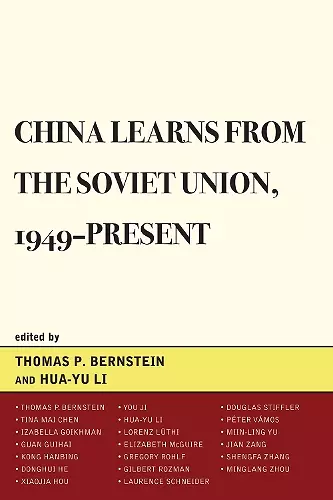China Learns from the Soviet Union, 1949–Present
Exploring China's adoption and rejection of Soviet practices
Hua-Yu Li author Hua-Yu Li editor
Format:Paperback
Publisher:Bloomsbury Publishing PLC
Published:23rd Jun '11
Currently unavailable, and unfortunately no date known when it will be back
This paperback is available in another edition too:
- Hardback£135.00was £150.00(9780739142226)

This book explores how China initially adopted and later rejected Soviet models across various domains, reflecting its unique journey since 1949.
In China Learns from the Soviet Union, 1949–Present, an international group of scholars delves into the complex relationship between China and the Soviet Union. The book explores how China initially embraced Soviet models in various domains, including economics, culture, and social practices, during the early years of the People's Republic. This acceptance was driven by a desire to modernize and develop rapidly, as the Soviet Union was seen as a successful communist state that could provide a blueprint for China's own growth.
As the narrative unfolds, the scholars analyze the factors that led to China's gradual rejection of these Soviet models. Key themes include the unique cultural and historical context of China, which ultimately necessitated a departure from Soviet practices. The book discusses significant events and policies that marked this shift, revealing the complexities of ideological adaptation and the pursuit of a distinct Chinese path to modernization.
China Learns from the Soviet Union, 1949–Present provides valuable insights into the interplay between ideology and pragmatism in China's development. By examining this fascinating historical trajectory, the authors highlight the lessons learned from the Soviet experience, shaping China's contemporary economic and social landscape. This scholarly work is essential for understanding the nuances of China's evolution in the context of its past interactions with the Soviet Union.
The Sino-Soviet relationship has played a critical role in the development of the People's Republic of China. Basing their analysis on recent documentation from Russia as well as China, the authors in this collection contribute fresh and important insights into the nature of that relationship. It should be essential reading for anyone seeking to understand the evolution of Chinese domestic politics and foreign policy. -- Steven M. Goldstein, Smith College
At the recent 60th anniversary of the People's Republic of China (PRC), an old slogan was repeated: 'Without the Chinese Communist Party there would be no New China.' We might also say: 'Without the Soviet Union, there would be no Communist Party of China,' and 'Without the Soviet Union, there would be no People's Republic of China.' The Chinese Communist Party grew up in the Stalinist era. Today, after three decades of market reform, there is still a Soviet DNA in its political culture. The essays in this volume, compiled by an outstanding group of international scholars, trace the story of China's most important foreign relationship in its periods of tutelage, partnership, and tension. They remind us that, whether as mentor or rival, revolutionary or revisionist, no foreign state has had greater weight in modern China than the Union of Soviet Socialist Republics. -- William C. Kirby, Harvard University
This excellent and important volume will come as a revelation to many readers. Nearly every conceivable facet of the Sino-Soviet relationship is covered. The book's breadth reveals just how pervasive the Soviet model was in Chinese society, economics, politics, and culture. -- Robert Ross, Boston College
This book is a fantastic resource for professors and students alike. It is a major work that will help scholars around the world to better understand the Soviet model's enduring legacy and how it affected and will continue to affect modern China. * China Quarterly *
The book contains a wealth of interesting and cogently presented perspectives on the Sino-Soviet relationship. It is highly recommended for both the specialist and the general reader. * The China Journal *
Although this tale of less than brotherly love is a familiar one, this volume provides a wealth of detail based on extensive field research and archival work, explaining exactly how, what, and why China borrowed from Soviet experience. Resulting from a 2007 international conference involving established scholars and younger researchers, the volume also goes well beyond conventional wisdom in the study of Sino-Soviet alliance relations to address the complex set of circumstances that set limits to Chinese emulation and to the Sino-Soviet relationship itself. * Slavic Review *
A sample of the soul-searching going on in Chinese academic circles about the reasons for the collapse of the Soviet Union, a subject that deserves greater attention for what it tells us about Chinese thinking regarding China’s own current political and economic challenges. * Slavic Studies *
ISBN: 9780739142233
Dimensions: 231mm x 162mm x 34mm
Weight: 839g
562 pages